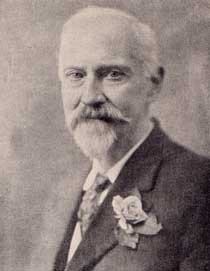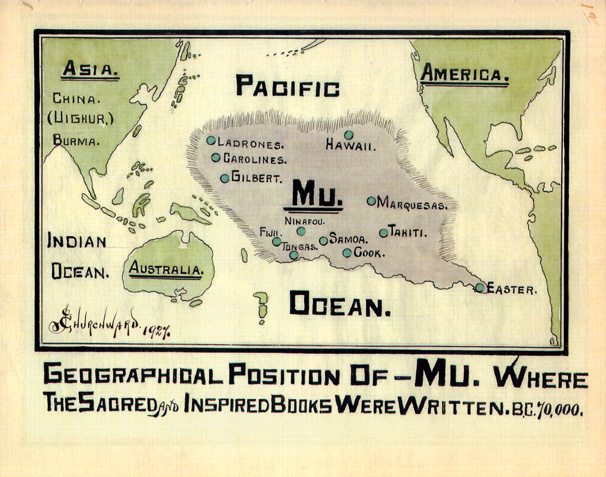According to Churchward, Mu “extended from somewhere north of Hawaii to the south as far as the Fijis and Easter Island.” He claimed Mu was the site of the Garden of Eden and the home of 64,000,000 inhabitants – known as the Naacals. Its civilisation, which flourished 50,000 years before Churchward’s day, was technologically more advanced than his own, and the ancient civilisations of India, Babylon, Persia, Egypt and the Mayas were merely the decayed remnants of its colonies.
Churchward claimed to have gained his knowledge of this lost land after befriending an Indian priest, who taught him to read an ancient dead language (spoken by only three people in all of India). The priest disclosed the existence of several ancient tablets, written by the Naacals, and Churchward gained access to these records after overcoming the priest’s initial reluctance. His knowledge remained incomplete, as the available tablets were mere fragments of a larger text, but Churchward claimed to have found verification and further information in the records of other ancient peoples.
His writings attempt to describe the civilisation of Mu, its history, inhabitants, and influence on subsequent history and civilisation.
 Churchward claimed that the ancient Egyptian sun-god Ra originated with the Mu; he claimed that “Rah” was the word which the Naacals used for “sun” as well as for their god and rulers.
Churchward claimed that the ancient Egyptian sun-god Ra originated with the Mu; he claimed that “Rah” was the word which the Naacals used for “sun” as well as for their god and rulers.
Alfred Metraux undertook research on Easter Island in the 1930s, and in 1940 published a monograph on Easter Island which includes a rebuttal of the hypothesis that Easter Island was a remnant of a sunken continent. In the second half of the twentieth century, improvements in oceanography, in particular understanding of seafloor spreading and plate tectonics, have left little scientific basis for geologically recent lost continents such as Mu.
Science writer Martin Gardner wrote that Churchward’s books contain geological and archaeological errors and are regarded by scholars as a hoax. The archaeologist Stephen Williams in Fantastic Archaeology (1991) described his writings as pseudoscience. Williams has written that his “translations are outrageous, his geology, in both mechanics and dating, is absurd, and his mishandling of archaeological data, as in the Valley of Mexico, is atrocious.”
Gordon Stein in Encyclopedia of Hoaxes (1993) has noted that Churchward’s claims have no scientific basis. According to Stein “it is difficult to assess whether Churchward really believed what he said about Mu, or whether he was knowingly writing fiction.”
Brian M. Fagan has written that Churchward’s evidence for Mu was made from “personal testimonials, false translations, notably of tablets from Mesoamerica, and spurious reconstructions from archaeological and artistic remains. Although it has attracted some following, it has never received scholarly or scientific support.”
Source: Wikipedia

